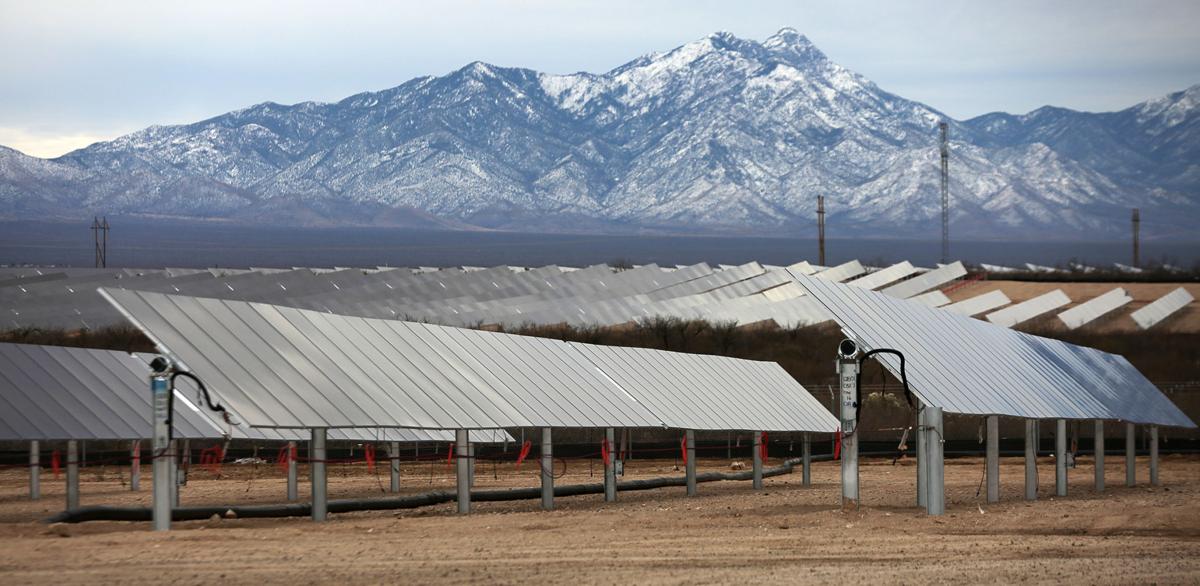Arizonans could see faster adoption of clean energy sources such as solar and wind after state regulators resurrected proposed clean-energy rules on Wednesday.
Reversing course after rejecting similar rules just a few weeks ago, the Arizona Corporation Commission voted 3-2 to advance new rules that would require Arizona utilities to get 100% of their energy from carbon-free sources like solar, wind and nuclear by the end of 2070 — 20 years later than originally proposed.
The Corporation Commission last November approved tentative rules that would require state-regulated utilities like Tucson Electric Power to go completely carbon-free in steps by 2050, replacing a current mandate adopted in 2006 requiring 15% renewable energy by 2025.
But those rules were voted down by the new commission on May 5 after the three-member Republican majority amended the plan to turn the proposed green-energy requirements into nonbinding goals.
That resulted in a backlash from supporters, including environmental groups and a coalition of businesses and business groups, who called the vote a giant step backward.
At a special open meeting on Wednesday, May 26, the commission reconsidered its vote on May 5, when Democratic commission members Sandra Kennedy and Anna Tovar joined Republican Justin Olson, an outspoken foe of any green-energy mandates, to kill the watered-down rules.
Tovar and Republican Commissioner Jim O’Connor, both first-term commissioners elected last November, successfully offered an amendment to keep the carbon-free standards as mandates but stretching out their compliance dates.
Under the rules approved Wednesday, utilities are required to reach 100% carbon-free power by 2070 in five steps, starting with 50% by the end of 2032, progressing to 65% by 2040 and reaching 80% by 2050.
The utilities would have to reach 95% carbon reduction by the end of 2060 and 100% by 2070.
Tovar and O’Connor teamed up to propose the new schedule of carbon-free energy mandates after Commission Chairwoman Lea Márquez Peterson, a Tucson Republican, queried the members in a letter filed May 12 to see if there were areas of compromise.
O’Connor responded in a letter that he would be willing to make the standards requirements, rather than goals, if the utilities were given more time to comply, noting that the original proposed rules allowed exemptions if complying with the requirements would affect service reliability.
Márquez Peterson said she was still concerned about the mandates pushing up electric rates and was more comfortable with setting goals.
She was joined in voting against the rules Wednesday by Olson, who has opposed to the rules all along and maintains they will unnecessarily lead to higher electric rates.
The latest version of the new energy rules won’t go into effect immediately.
Because the commission made substantial changes to the rules as originally proposed and published, the version approved Wednesday will have to go through a supplemental rule-making procedure, allowing at least 30 days for further public comment and requiring new hearings.
The clean-energy mandates in the original proposal were supported by TEP and APS, which have ambitious green goals of their own.
TEP has announced plans to deliver more than 70% of its energy from solar and wind and cut carbon emissions by 80% by 2035.
APS, which can count power from its Palo Verde Nuclear Generating Station as carbon-free energy, has a goal of providing 65% carbon-free and 45% renewable energy by 2030, with a goal of 100% carbon-free by 2050.
Besides setting new clean-energy mandates, the proposed rules would increase the state’s energy-efficiency standards, prompting utilities to adopt enough energy-saving measures by 2030 to offset 35% of their 2020 peak demand, up from an existing 22% requirement.
Ceres, a nonprofit environmental advocacy group and businesses, who backed the new rules, applauded the Corporation Commission’s change of heart.
Alli Gold Roberts, Ceres director of state policy, called the commission’s action “a welcome reversal of the shocking move to block the rules earlier this month, and one that will help put the state back on track to reap the benefits of the clean energy future.”
More than two dozen businesses and associations, including Ball Corp., Google, Johns Manville, Microsoft, Salesforce and the Arizona Technology Council, had signed a letter urging the Corporation Commission to adopt the energy rules originally adopted last November.
But another environmental group, Western Resource Advocates, said latest version of the rules is inadequate.
“The 2070 date for reaching carbon-free electricity falls far short of meeting the timeframe that scientists tell us is needed to avoid the worst impacts of climate change,” said Adam Stafford, Western Resource Advocates’ senior staff attorney in Phoenix.
That triangle of arrows indicates the item is recyclable, but not necessarily here in Tucson or Pima County. The little number in the middle is important. Video courtesy of Tucson Environmental Services.





